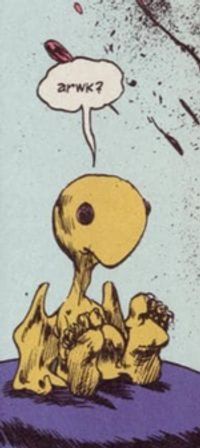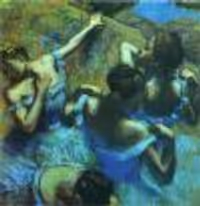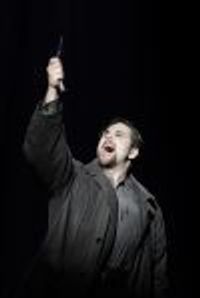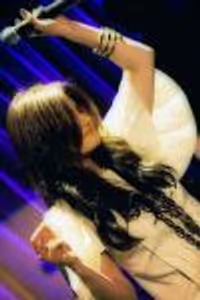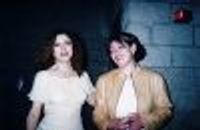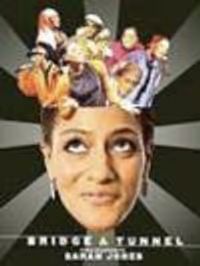company vs sweeney todd
#1company vs sweeney todd
Posted: 1/12/07 at 9:34pm
Which of doyle's productions did you like better and why?
I'm debating whether or not to see company....
#2re: company vs sweeney todd
Posted: 1/12/07 at 10:33pmSee COMPANY any way! Whether or not you loved SWEENEY, they are both productions worth seeing if for no other reason than the Sondheim music and some great performances.
#3re: company vs sweeney todd
Posted: 1/12/07 at 10:48pmi have to say that the concept worked beautifully (and the best) with the west end's MACK AND MABEL.
#4re: company vs sweeney todd
Posted: 1/12/07 at 10:49pmi saw mack and mable and loved it! I would love to see suessical done with intrusments or once on this island.
#5re: company vs sweeney todd
Posted: 1/12/07 at 11:11pmAlthough I liked the concept with Sweeney, I think it works so much better with the story and themes of Company. It was just a concept in Sweeney, but it has an actual (plot-driven) purpose in Company.
Wanting life but never knowing how
#6re: company vs sweeney todd
Posted: 1/12/07 at 11:17pm
I loved both.
but I think it works best with Sweeney
C is for Company
Broadway Legend Joined: 7/16/05
#7re: company vs sweeney todd
Posted: 1/13/07 at 1:23amAdored both, however as many have stated in the past and I will agree with, Company IS a concept show that has always been built around that. So for all practicality, I found Companys concept to make the most sense and work better than it did in Sweeney as fantastic as it was.
#8re: company vs sweeney todd
Posted: 1/13/07 at 1:31am
I feel it worked better with SWEENEY because the inmates are telling the story
"Attend the Tale of Sweeney Todd"
and Doyle put them in an institution where they were putting on a play (you could say this was stolen from MARAT/SADE)
But that way it works.
COMPANY as Brecthian as it is portrays actual New Yorkers dealing with emotions and feelings.
So the use of instruments (for me)
distracted from the scenes.
Updated On: 1/13/07 at 01:31 AM
#9re: company vs sweeney todd
Posted: 1/13/07 at 2:49am
I agree: Sweeney. I think 'cause it's larger than life, it just makes it even more wonderful with the instruments (plus, who doesn't want to see Patti LuPone play the tuba?). It's such a surreal experience as is, but adding instruments on stage just makes the show an experience like no other.
I'm not against Doyle's Company (although I wonder if this is going to become a trend of his - - please, god, I don't wanna see Into the Woods by Doyle!!), yet I agree with the above posts. The instruments distract from the - - I can't say it any better than the above post - - Brechtian portrayal of these people.
#10re: company vs sweeney todd
Posted: 1/13/07 at 6:50am
>> I wonder if this is going to become a trend of his - - please, god, I don't wanna see Into the Woods by Doyle!
He has mentioned his interest in NIGHT MUSIC. Be afraid. Be very afraid.
#11re: company vs sweeney todd
Posted: 1/13/07 at 7:24amI liked Sweeney much better. I didn't like Company to begin with. It didn't translate for me. I found the performances lackluster with the exception of Esparza. I also couldn't identify with the story and wasn't captured by the music.
#12re: company vs sweeney todd
Posted: 1/13/07 at 8:43am
"He has mentioned his interest in NIGHT MUSIC. Be afraid. Be very afraid."
Ye gods! I mean, admittedly its the next closest chamber-style thing Sondheim has going... and I'd love to see it back on the stage.... and I'm sure the quintet could play some music.
But, yeah, I'm a little iffy. Are they gonna be able to waltz with their cellos as well?
#13re: company vs sweeney todd
Posted: 1/13/07 at 8:58amI think the concept worked SO SO much better for Company. I found it to be limiting at times for Sweeney and a little gimmicky, but in Company, which (as mentioned) is a concept show anyway, it makes more sense and has a deeper purpose; I think it's liberating more than limiting.
#15re: company vs sweeney todd
Posted: 1/13/07 at 9:17amSWEENEY worked far better (and yes, the Marat reference is a good one; I wonder if that was on Johnny's mind when he started this?). In COMPANY it required such a serious suspension of disbelief that it moved from theatricality to the utterly absurd. Sophisticated New Yorkers doing this? It evokes memories of the old advertising line, "They laughed when I sat down to play the piano".
#16re: company vs sweeney todd
Posted: 1/13/07 at 4:09pmSweeney is probably the show I like better, but Doyle's concept worked wonders for Company.
beezhead
Swing Joined: 6/9/04
#17re: company vs sweeney todd
Posted: 1/13/07 at 5:33pmattend the tale of sweeney todd.
#18re: company vs sweeney todd
Posted: 1/13/07 at 5:48pmCompany. I liked it much better because it was plot driven.
sondhead
Broadway Star Joined: 10/25/06
#19re: company vs sweeney todd
Posted: 1/13/07 at 5:59pm
"Although I liked the concept with Sweeney, I think it works so much better with the story and themes of Company. It was just a concept in Sweeney, but it has an actual (plot-driven) purpose in Company."
So is Sweeney's. Look at Harold Prince's staging, with the peasants moving the set pieces. The instrument playing is kind of an extention of that.
chrrymn
Broadway Star Joined: 7/20/05
#20re: company vs sweeney todd
Posted: 1/13/07 at 6:10pm
I think the concept works well for both shows, but I enjoyed it better in Sweeney. With a smaller cast it was easier (for me, anyway) to acknowledge the instruments. Not that it was distracting, I just loved to watch them play from time to time. But in Company, there was so much going on that sometimes I forgot they were playing! Company is wonderful...but there's nothing like the first time.
"Mrs. Lovett, how I did without you all these years I'll never know!"
Avatar photo (c) Paul Kolnik.
#21re: company vs sweeney todd
Posted: 1/13/07 at 6:19pm
The original question was which you like better. So to answer that, I loved Sweeney very, very much, but I think I love Company more. For me, that's heavily based on emotion, though, so objectively fairly worthless. They are/were both genius, IMO.
Because they're so different, though, the more important question (as a lot of people have already touched on) is probably really about how the concept work. I think Sweeney was a concept dropped on a show (originally out of necessity), as opposed to a show chosen to fit the concept, which is more accurately the case for Company. The instrument concept in Sweeney had many little moments of brilliance, but the instrument concept in Company creates a big, sweeping conceit (which is probably the deeper meaning that BG107 referred to). There are a lot of cases to be made for a conceit within Doyle's production of Sweeney (for example, that the people in the asylum were engaging in some sort of music therapy), but they're all interpretive; Company's is much more concrete.
For what it's worth, in terms of the written material, I think Sweeney is a stronger piece, but I think Doyle's concept works better for Company. For Sweeney it was a really innovative way to tell the story, and certainly worked beautifully, but in Company, I think it very much adds to the story -- again, there's that deeper meaning. I think, as I've said so many times before, that it drives home in a really beautiful way, how deep Bobby's problem runs. One moment that always sticks in my mind is during The Little Things You Do Together, when everyone is paired off, surrounding Bobby, and he's just sitting in the middle, nearly eclipsed by it all. Sure, you could emulate similar staging in a regular production, but I think the symbolism really helps the show's depth. Theater's about showing, not just telling, and I think Doyle has a very acute understanding of how to do that well.
To the original poster, see it if you're able. You won't want to have missed it when it's gone.
#22re: company vs sweeney todd
Posted: 1/13/07 at 6:22pmI don't know if I can choose. I Absolutley adored both and can make an argument for each.
Videos


